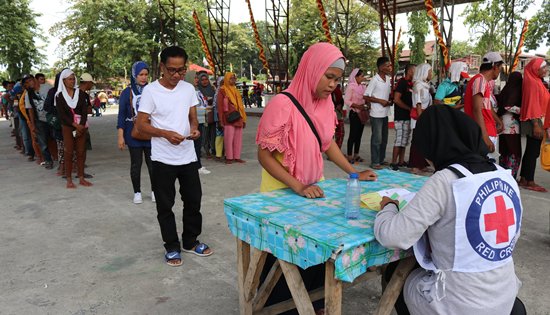|

Thousands
of families in Maguindanao province in southern Philippines
have been facing repeated and prolonged displacement for six
months now due to the clashes between government forces and
armed groups. To support them, the ICRC with the Philippine
Red Cross provided two-week food rations to 1,280 displaced
families (approximately 6,400 people) on Sept. 4-5.
(ICRC/
Baipulo Sultan) |
Civilians bear
the brunt of recurrent fighting in Maguindanao
By
ICRC
September 6, 2019
MANILA – Thousands
of families in Maguindanao province in southern Philippines have
been facing repeated and prolonged displacement for six months now
due to the clashes between government forces and armed groups. They
are in need of support, as the return home to their villages remains
uncertain.
“It’s the second time that
thousands of families in Shariff Saydona Mustapha and Datu Salibo
towns have had to stay in cramped evacuation sites for over a month.
They are afraid to return home as the situation there remains
volatile,” said Roberto Petronio, interim head of the International
Committee of the Red Cross (ICRC) subdelegation in Cotabato.
The ICRC teams from
Cotabato assessed the condition of these affected communities over
the past few weeks, identifying the needs and listening to their
concerns.
Displaced and unsure about
the immediate future, these families have been unable to earn a
steady income as their access to farms remains restricted. Though
various government agencies promptly distributed food items among
those displaced, other basic needs have persisted.
“Living in a tent is very
difficult, especially when it rains. We have no choice but to endure
it. Both my children are in elementary school but they haven’t been
able to attend classes due to the clashes. I hope we can return home
soon without any fear and go back to leading a normal life,” said
Yahiya Alabay of barangay Ganta in Shariff Saydona Mustapha.
Yahiya’s family is among
the 1,280 households (approximately 6,400 people) in barangays
(villages) Ganta, Bakat, Inaladan and Dasawao in Shariff Saydona
Mustapha and Penditen in Datu Salibo who collected ICRC food rations
during the distribution held on Sept. 4 to 5.
With the support of the
Philippine Red Cross (PRC), the ICRC’s operational partner, each
family received two-week rations consisting of 25 kg of rice, 2
litres of cooking oil, 1 kg of sugar, ½ kg of salt, one litre of soy
sauce and 12 tins of sardine.
After the clashes first
broke out in March, the ICRC with the PRC provided food, household
and hygiene items to around 6,700 displaced people in Datu Saudi
Ampatuan, Datu Unsay, Shariff Aguak and Datu Salibo.
From April to July,
regular trucking of potable water was done for almost 5,500 people
living in evacuation sites. Rural health units in eight Maguindanao
towns and three hospitals were also supplied with medicines and
medical material to cater to over 11,000 people in April and in
August.
“We will continue to
monitor the situation and extend our help based on the needs.
Ultimately, we hope that these displaced families can safely return
home to a stable life,” Petronio said.
The ICRC is a neutral,
impartial and independent organization whose exclusively
humanitarian mission is to protect the lives and dignity of victims
of armed conflict and other situations of violence and to provide
them with assistance. It has an international mandate to promote
knowledge for and compliance with the international humanitarian
law.
As civilians continue to
bear the brunt of fighting, the ICRC reminds all parties to the
conflict of their obligation to protect civilians and civilian
properties, and those who are not or no longer participating in the
hostilities.